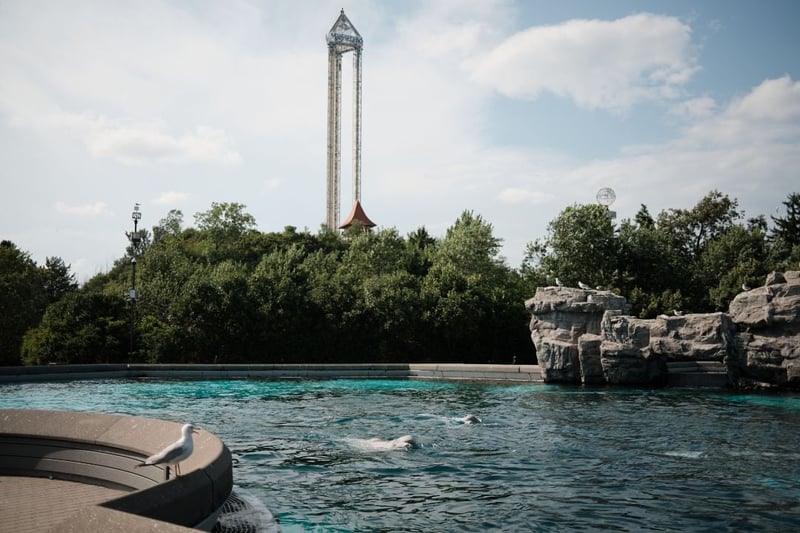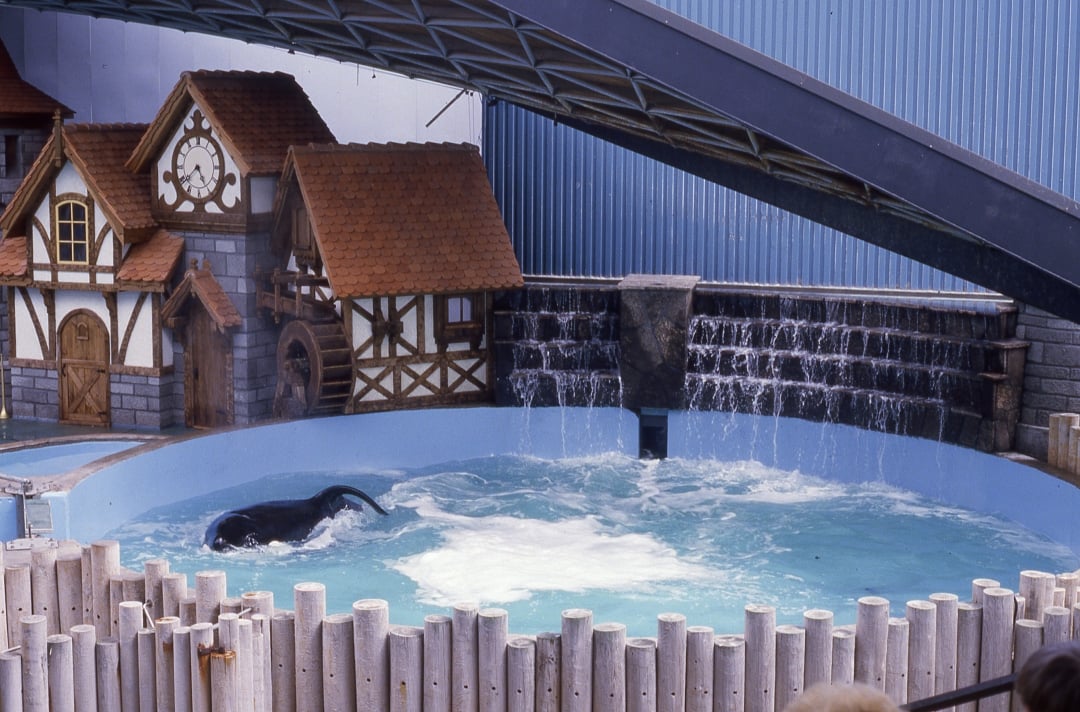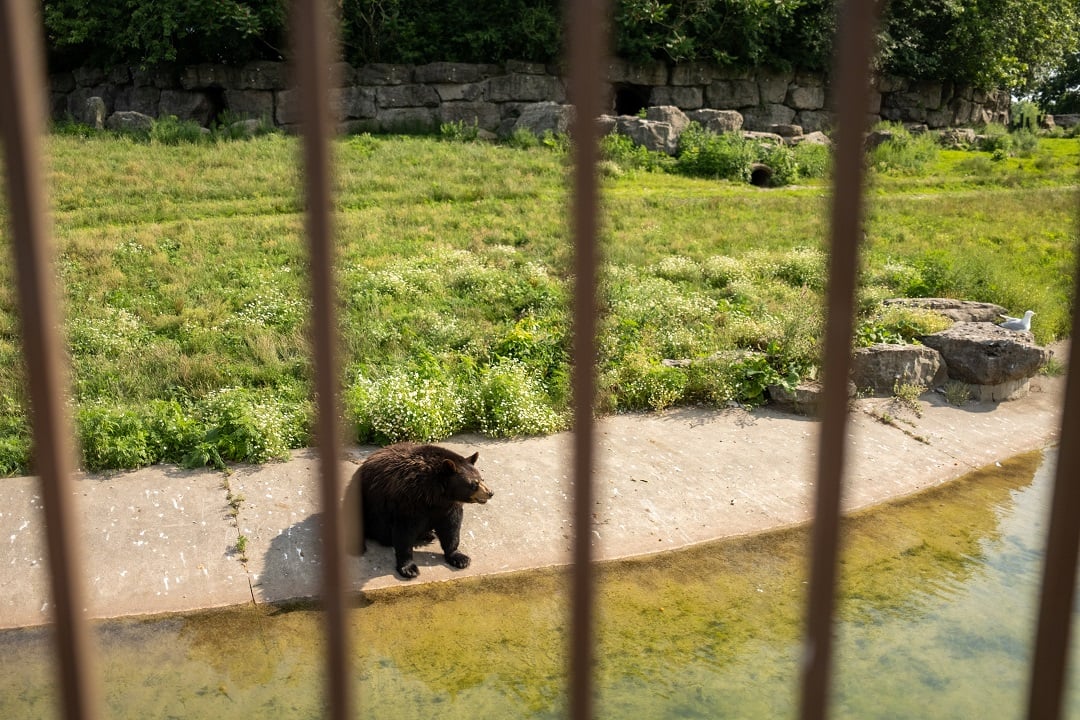
How advocacy ended Marineland’s era
Blog
For over 60 years, Marineland in Niagara Falls held whales, dolphins and hundreds of other animals in captivity for entertainment. Today, the park is permanently closed – a victory for animals and for the decades of advocacy that made it possible.
Thanks to the tireless efforts of World Animal Protection, allied organizations, former trainers and concerned citizens, Canada has finally turned a page on marine mammal captivity. Animals will no longer be forced to perform and the focus can shift to giving the remaining animals a life of dignity.
Timeline of change:
1961 – Marineland opens
John Holer opened the park in Niagara Falls. For over 60 years, Marineland operated as an amusement park featuring captive whales, dolphins and hundreds of land animals. Its slogan promised “everyone loves Marineland,” but behind the scenes, animals lived and died in distress.
1963 – Sea lion escapes
One of Marineland’s first star attractions, a sea lion named Jeff, escaped under the fence. Three days later, he was found basking on a beach in Niagara-on-the-Lake. When attempting to recapture him, the sea lion bit Holer’s bicep but was eventually wrangled into the back seat of a car and returned to Marineland.
1977 – US seizes dolphins caught by Marineland owner
The U.S. Department of Fisheries seized six bottlenose dolphins caught by Holer in the Gulf of Mexico, destined for Marineland.
1985 – Keiko at Marineland
Keiko, an orca best known for starring in Free Willy, arrived at Marineland in the early 1980’s before being sold to a Mexican aquarium in 1985. Keiko underwent a rehabilitation program during the 1990’s, and was eventually released in Iceland, making his was to Norway. After nearly a year and a half in Norway, Keiko died from a pneumonia-like condition in 2003.
 An orca in a tank at Marineland. (Photo: Bob Hilscher / Shutterstock)
An orca in a tank at Marineland. (Photo: Bob Hilscher / Shutterstock)
2004–2010 – Marineland evicts residents for expansion
Marineland purchased Green Oaks Trailer Park in 2004. Five years later, 47 families received eviction notices. Advocacy groups highlighted these actions as part of a broader pattern of disregard for life and accountability, pressuring regulators to act.
2012–2013 – Beluga death sparks action
A Toronto Star investigation exposed widespread neglect and animal suffering at Marineland, marking a turning point in public awareness and advocacy. The exposé detailed disturbing accounts from former employees and revealed inadequate care, poor water quality and numerous unexplained animal deaths.
That same year, a young beluga was killed after an attack by two male belugas at the facility, highlighting the risks of confinement in inadequate enclosures. Following this and years of documented neglect, Marineland receives seven orders to improve the animal care at the facility by the OSPCA, including to stop burying dead animals. A former supervisor at the facility noted that one mass grave held more than 1,000 corpses including orcas, belugas, dolphins, seals, sea lions, buffalo, deer, bears and other animals.
In 2013, the release of the documentary Blackfish further shifted global perceptions of marine mammal captivity. Featuring footage and testimonies that included Marineland, it helped spark what activists called “the Blackfish effect” - a surge in public opposition to the exploitation of whales and dolphins for entertainment.
2017 – Marineland charged with animal cruelty
The OSPCA charges Marineland with six counts of animal cruelty related to the elk and deer kept at the facility.
2019 – Tragedy and milestones
Marineland announced the deaths of a walrus and two deer who were killed in an opening day stampede.
That same year marked major milestones in the fight to end marine mammal captivity. World Animal Protection and the Animal Welfare Institute launch The Case Against Marine Mammals in Captivity report, distributing it to Canadian Parliamentarians to demonstrate the urgent need for federal action. Soon after, Canada passed Bill S-203, the Free Willy Bill, officially banning the breeding, capture and trade of whales and dolphins for entertainment. This historic law signaled the beginning of the end for Marineland’s business model.
World Animal Protection also released the Behind the Smile report, which reviewed welfare conditions for over 3,000 captive dolphins held at Marineland and other entertainment venues around the world. In response to mounting public pressure, Canada’s largest airline vacation companies - Air Canada, Transat, West Jet and Sunwing - committed to ending their sale and promotion of venues that keep marine mammals for entertainment.
2020–2023 – Animal suffering exposed
Ontario’s Animal Welfare Services found marine mammals “in distress” at Marineland. Former trainers came forward describing poor conditions and medical neglect, and multiple cruelty charges followed. Following the ban in 2019, Marineland is charged in 2021 for continuing to use whales and dolphins for entertainment.
When Kiska, the last captive orca in Canada, died in 2023, they became a powerful symbol of the cruelty of confinement.
2024 – Public pressure intensifies
Marineland’s owner, Marie Holer, passed away, leaving uncertainty about who will oversee the park. She had taken over from her husband, John Holer, after he passed away in 2018. Her passing came amid intense public and legal scrutiny, with repeated beluga deaths and convictions for animal cruelty putting the future of the facility in question.
In 2024, World Animal Protection and thousands of supporters made it clear: enough is enough — Marineland must shut down for good. Calls for government intervention grew louder as the facility was found guilty under animal cruelty laws for their care of three young black bears.
 A captive black bear at Marineland. (Photo: World Animal Protection / Sasha Rink)
A captive black bear at Marineland. (Photo: World Animal Protection / Sasha Rink)
Advocacy efforts continued, pushing for government intervention. By summer, most exhibits were closed. Since 2019, a total of 17 belugas, one orca, one dolphin, two seals and two sea lions died. Tragically, three of the five belugas Marineland sold to Mystic Aquarium in the U.S. also passed away.
2025 – Marineland shuts down for good
This fall, Marineland confirmed its permanent closure. After the government blocked the export of its 30 remaining belugas to China, the park threatened euthanasia if emergency funding wasn’t provided.
With Marineland’s closure marking the end of an era of marine mammal captivity in Canada, attention has now turned to ensuring lasting change. In May, Members of Provincial Parliament (MPPs) Lucille Collard and Karen McCrimmon reintroduced a landmark bill in the Ontario Legislature: Bill 35, the Captive Wildlife Protections Act, aimed at addressing the broader crisis of animals kept in inadequate roadside zoos across the province.
Now, the focus must be on ensuring all of Marineland’s remaining animals are safely rehomed where they can finally live with dignity. This includes supporting initiatives like the Whale Sanctuary Project in Nova Scotia and proposed sanctuaries for the other animals still living at Marineland, including bears, deer and elk.
Help protect animals
While Marineland is closed, the work isn’t done. The remaining animals need our protection and the most urgent step is ensuring Ontario Premier Doug Ford and provincial Ministers act decisively to protect them from further harm.
You can make a difference today by sending an e-letter urging the Ontario government to listen and show leadership for these animals.
At the same time, we must continue tackling the broader problem of captive wildlife in degrading roadside zoos. Thousands of wild animals in Ontario live in small, filthy cages where they cannot express natural behaviours and social animals are often kept in complete isolation. Supporting stronger provincial zoo regulations ensures long-term protections for all animals in captivity, preventing future suffering.
Together, we are helping end decades of suffering at Marineland. Now let’s finish what we started and ensure this crisis never happens again.
Banner photo: World Animal Protection / Sasha Rink
 Our team has been advocating for the animals at Marineland for decades! (Pictured: Melissa Matlow, Campaign Director, protesting outside of Marineland.
Our team has been advocating for the animals at Marineland for decades! (Pictured: Melissa Matlow, Campaign Director, protesting outside of Marineland.